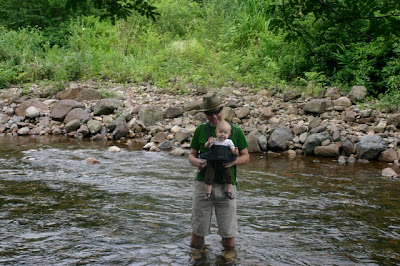 This week, Facebook and blogs and even (gasp!) real life conversations have been lit up by an article by Anne Marie Slaughter, who had worked in policy planning at the Obama State Department, about the (im)possibility of mixing motherhood and career. The piece, an honest portrayal of the difficulties of second and third generation feminist women to "have it all" has clearly touched a vein among my friends who work as lawyers, policy professionals, doctors... truth is, pretty much everyone with whom I went to Harvard or Williams, and who then went on to be a mother and a high powered professional.
This week, Facebook and blogs and even (gasp!) real life conversations have been lit up by an article by Anne Marie Slaughter, who had worked in policy planning at the Obama State Department, about the (im)possibility of mixing motherhood and career. The piece, an honest portrayal of the difficulties of second and third generation feminist women to "have it all" has clearly touched a vein among my friends who work as lawyers, policy professionals, doctors... truth is, pretty much everyone with whom I went to Harvard or Williams, and who then went on to be a mother and a high powered professional.Rita and I have not had to face anything like the world Slaughter describes: no 20 hour work days, no leaving the house before the kids wake and coming home after they are asleep, no impossible choices between a sick baby and a professional deadline. Next month, Rita will go to an anthropology conference in São Paulo, and it will be the first time that Helena Iara will have to spend a night without her mommy in the same house. None the less, we have seen enough of the challenges of parenting and working to know how much harder it must be for someone working at the United Nations, in government, in a bill-by-the-hour law firm. Slaughter is right: after fifty years of feminist successes in policy and ideology, children still make it much harder for women to climb the professional ladder.
I don't recall which of my professors declared that philosophy does not have the role of answering questions, but of asking why we ask those questions in the first place, but it's a good place to enter this debate (and is the starting point for William James and Ludwig Wittgenstein, two of my favorite thinkers). So here's my poor contribution to the debate:
I've been readying Dostoyevsky recently, and finding some humor amidst the gloom by laughing at the silly hierarchies of state bureaucrats, classed just like military officers in 19th Century Russia, with a "Collegiate Registrar" equivalent to a warrant office, a "Titular Counsellor" like an Army Captain, all the way up to an "Actual Privy Counsellor" who held the same rank as a Field Marshall. Russians of that age may have taken the quest for honor so far that it becomes ridiculous, but they aren't that much different than we are, with different levels of professorships, pay-grades for government service, and whether or not one becomes a partner. Men have always dedicated themselves to honor, in one way or another.
Mainstream American feminism has done an extraordinary job of showing why and how women have been oppressed and excluded, but at a price: it has accepted masculine terms for the debate. When we look at definitions of success for women (or for feminism in general), we ask about how many women sit in corporate boardrooms, what salary women earn, how many women work in policy roles in government. I wonder, though, if these concerns don't simply accepted traditional masculine (and not universally human) milestones for success. Even the question "Why can't women have it all?" uses the verb most associated with honor in postmodern capitalism. As Marx (among many others) noticed, capitalism moves us from a concern with being to one of having.
That move from being to having was critical: no one would ever ask if you can "be it all." Of course not: you can't be mother and father, God and man, master and servant... the verb "be" recognizes that certain things exclude each other. But "have"... It seems like, hypothetically at least, we could possess everything.
Slaughter addresses this question in a way: she says that she and many women like her (and many men, as well), work as hard as they do because it is the way they can change the world; she herself was working in Planning for the State Department, and cites many women in government, academia, and the international human rights system. Here, for better or worse, I might be able to add something useful: I know lots of people who have both worked at the grass roots and in "the system", and almost all of them say that they are not only happier on the "outside", but that they do more good (a quick caveat to expose my bias here: after working in Washington think tanks and going to Harvard, I made a conscious decision that I didn't want that life; I'm not an objective observer). People at UNICEF, the Foreign Service, government education departments... To quote one high UNICEF bureaucrat I met last year, "Let's be honest, I could do a lot more elsewhere. But when I look at myself, I know that I wouldn't earn as much or get as much prestige elsewhere. So I stay."


















































